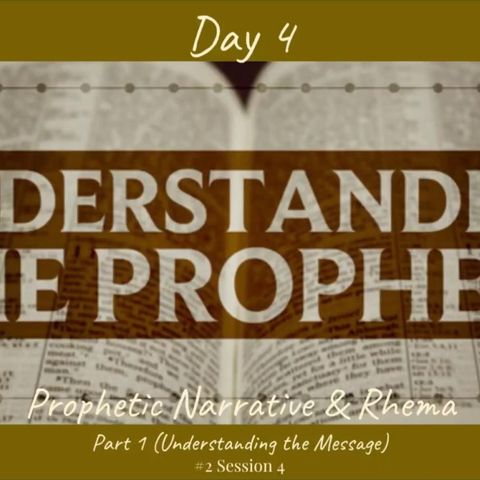1 October 2019 (#2 Session 4) Day 4 - Prophetic Narrative & Rhema (Pt 1 - Understanding the Message)

Scarica e ascolta ovunque
Scarica i tuoi episodi preferiti e goditi l'ascolto, ovunque tu sia! Iscriviti o accedi ora per ascoltare offline.
Descrizione
Shalom Aleichem and welcome to my bi-monthly blog! Previously, we saw how God had progressively released His Rhema in His Kairos - first to the Old Testament Prophets, then to...
mostra di piùPreviously, we saw how God had progressively released His Rhema in His Kairos - first to the Old Testament Prophets, then to the Apostles and the Church, and now to those of us who recognise the signs of the times. These are not 3 separate messages but a single unified voice or prophetic narrative. If I could sum up this 3-part message in a simple sentence, it would be “the Messiah would come, came as Jesus, and will return soon to establish His Kingdom.” In this session, I want to highlight 3 very important aspects to understanding this prophetic narrative:
First, this message that we are now called to proclaim is not something new to the Word of God - like a new book or chapter in addition to what has already been written in the Bible. The Bible itself warns us not to add to or subtract from God’s Word. It is a message that had been there all along, only that it was hidden in the Scriptures in various signs and symbols, peoples and events throughout the Bible, as we have seen for ourselves in our study so far of the first four Days of Creation.
God’s messengers in the past had in fact hinted at Its existence. Even as they prophesied and declared those things that were made known to them, they pointed to something more and the incompleteness of their own understanding.
Having said this however, this message is new in that what was hidden before - the Bible uses the term “mystery” - has now been made known to us in God’s Kairos.
Jesus spoke about this in Matthew 13:52. During His time, God’s written word consisted only of the Old Testament - also known as the Law and Prophets. This was because the rest of the Bible - the New Testament - had yet to be written. However, Jesus said that when those who taught God’s word became His disciples, they would find in the “storeroom” of the Old Testament not just the “old treasures” of what they already knew, but “new treasures” of mysteries and things unknown to them previously which were now made known and explained to them by God’s revelation.
The Apostle Paul is the best example of this - he used to possess only the “old treasures” of the Law and Prophets as a devout Pharisee or Jewish religious teacher. However, following his conversion, God revealed to Paul the two greatest mysteries hidden in the Old Testament - that of the Gospel of Jesus Christ and the mystery of the Church opening the way for Gentiles into God’s Kingdom. His writings concerning these two mysteries make up almost half of the New Testament books.
Today, we are privileged to be that generation who will find in the Bible not just the “old treasures” of what have already been taught - the doctrines that make up our Christian faith - but also “new treasures” concerning the final mysteries surrounding the end times - understanding the signs of the times, knowing the nearness of Jesus’ return, recognising the trials that will arise and therefore preparing and equipping ourselves for what needs to be done - if we believe and receive God’s Rhema that is being released today.
Lastly, this message completes the entire picture, the culmination of a common prophetic narrative. As mentioned earlier, the Old Testament Prophets addressed various nations over a period of four centuries, bringing God’s Rhema to His people as well as His enemies. Yet there was a common theme or narrative shared by these prophets that would only be partially fulfilled during their time, nor was it completely fulfilled at the first coming of Jesus, but pointed to a distant future - a future which is now upon us - when God will bring about its eventual and complete fulfilment.
The thought of prophecies having partial and multiple gradual fulfilments should not surprise us given our earlier cyclical understanding of time. This idea is best reflected in the Jewish word for year (Shanah) - it shares the same root as the words “repeat” and “change” portraying time as an ascending helix,
Informazioni
| Autore | Issachar B7D Fellowship |
| Organizzazione | Issachar B7D Fellowship |
| Sito | - |
| Tag |
Copyright 2024 - Spreaker Inc. an iHeartMedia Company
